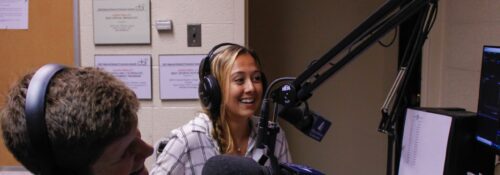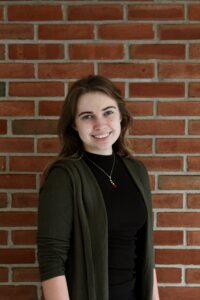
You’re Listening to WRFH Radio Free Hillsdale
Written by Lauren Smith
My qualifications as a radio broadcaster included zero public speaking experience, zero knowledge of how to “run the board” (or what a board was, unless it meant something you could dive off), and zero comprehension of the FCC guidelines for broadcasters.
Despite this, the WRFH radio station meeting was the first extracurricular I attended at Hillsdale College. This was because my father had once wanted to be a disc jockey, which sounded like a fun time, and because I had written in my college application essays that I wanted to learn public speaking. What better way to become an oratorical DJ than to join the college’s radio station?
The station’s general manager and radio journalism lecturer, Scot Bertram, promised he’d teach me everything I needed to know. Never seen a waveform? No problem. Can’t differentiate metadata from file names? Don’t worry. Almost before I knew what was happening, I had signed up to record weekly newscasts, sports updates, and weather reports.
The following Tuesday, I cleared my throat and scooted my chair toward the station microphone for the first time. My newscasts were pre-recorded, which meant I didn’t have to worry about stumbling during a live broadcast, but I was still keenly aware that every listener in a fifteen-mile radius was about to hear me speak. No longer could I blame the weatherman for never looking out the window; I was now the weatherman, and it was my responsibility to look out the window. Unfortunately, there were no windows in the studio.
In fifteen short minutes, Bertram had taught me everything I needed to know about Adobe Audition (for editing), the radio news aggregate (for picking stories), and Dropbox (for uploading to the station computer). I was surprised by how simple the process was. There were details I missed—for example, the computer doesn’t accept .WAV files—but I was quick to learn from my mistakes, and Bertram was a patient teacher. More than once, I innocently butchered a famous athlete’s surname during a sportscast. He reminded me to look up names I wasn’t certain how to pronounce and told me that I could always ask him if I needed help.
A few weeks into my recording sessions, I started getting creative. Instead of saying, “On Friday, we’ll see a high of 40 degrees,” I found myself skipping the script and joking about abnormally high temperatures for Michigan in September. I became more confident in choosing stories and reported on everything from newly discovered lake bacteria to Biden’s latest tax plan.
It wasn’t quite enough, I discovered, to only be at the radio station once per week. So I started thinking of ideas for my own show. Then, I approached Bertram with an idea.
“As you know, I’m a writer,” I said. (I think this came as a surprise.) “Exam season is approaching, and all the students are writing papers. What if I recorded a weekly feature about grammar rules and technical writing tips?”
Bertram liked the idea, and thus, Grammar Minute was born.
The next week, instead of my usual newscast opener, I crafted a new script. “Welcome to the Grammar Minute,” I announced, “where we’re saving the English language sixty seconds at a time!” The pilot episode was a success, and that was only the beginning.
Then came the day to submit recordings to state and national broadcast competitions, and with spectacular timing, I was knocked flat by my first-ever sinus infection. Everyone could tell; my voice didn’t leave much room for doubt. “Got a cold?” my friends asked, sympathetic, and I answered: “I hab. Or subting like it, eddyway.” This didn’t stop me from recording an entry for the competition, clearing my nose as best I could per advice from my choir friend. Somehow, my worst day ended up being my best. The newscast I produced through a half-closed throat won a national broadcasting competition.
Radio fulfilled my wish to practice public speaking (although I haven’t gotten to DJ yet). But that wasn’t the only thing it taught me. By trying something new, by struggling through the hard days, by accepting and overcoming each challenge, I discovered a brand-new activity I never imagined I’d enjoy so much. If you’d asked me when I was in high school whether I’d ever become a radio broadcaster, I would have laughed. Now, the possibility doesn’t seem so remote.
It’s never safe to try new things. You might end up giving the wrong baseball score, or you might end up stumbling over a hard-to-pronounce name in an interview. But these experiments are also immensely rewarding. When you think you’re at your worst—unprepared, or sick, or suffering from stage fright—the first step to success is just to try.
My advice: Don’t be afraid to mess up. For every risk, there’s a reward. And at a college like Hillsdale, where opportunities abound and students are fearless in the face of challenge, the rewards are often tremendous.
 Lauren Smith, ’25, is a prospective political economy major and French minor. Outside of starting arguments in philosophy class, she enjoys curling up on a bench outdoors (sun, rain, or snow) to write novels or articles for her blog, www.laurensmythbooks.com.
Lauren Smith, ’25, is a prospective political economy major and French minor. Outside of starting arguments in philosophy class, she enjoys curling up on a bench outdoors (sun, rain, or snow) to write novels or articles for her blog, www.laurensmythbooks.com.
Published in November 2022